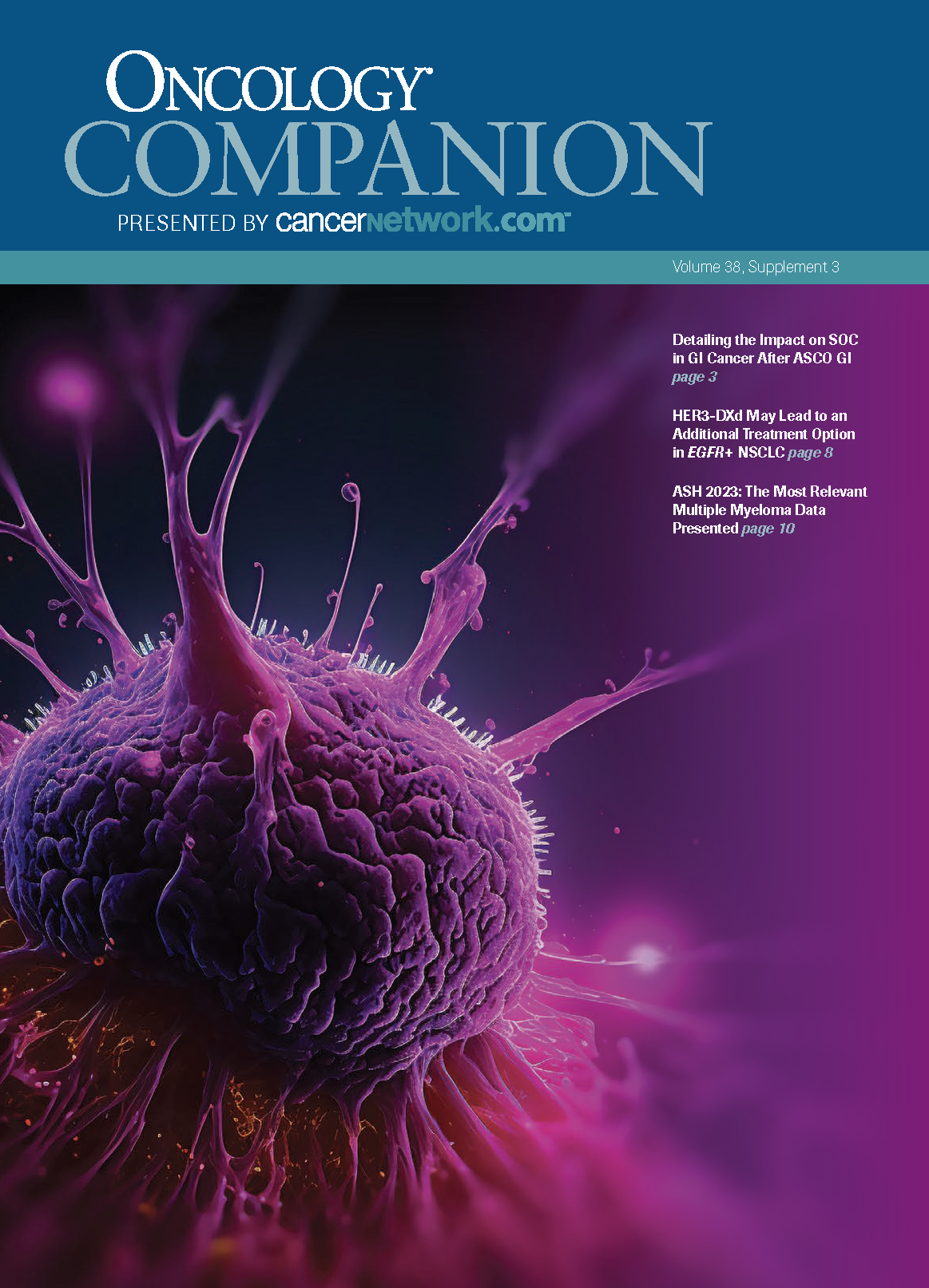ASH 2023: The Most Relevant Multiple Myeloma Data Presented
Joshua Richter, MD, led an enthusiastic panel with his colleagues in the multiple myeloma space following the 2023 ASH Annual Meeting and Exposition.
The expert panel

Joshua Richter, MD, led an enthusiastic panel with his colleagues in the multiple myeloma space during a 2 Minute Drill program following the 2023 American Society of Hematology (ASH) Annual Meeting and Exposition. Richter, associate professor of medicine in The Tisch Cancer Institute, Division of Hematology and Medical Oncology at Mount Sinai, set the groundwork at the beginning of the program, letting his colleagues know that they could offer any unbiased thoughts and opinions from the recent meeting.
He was joined by Beth Faiman, PhD, CNP, a hematologic oncologist from the Cleveland Clinic; Jeffrey V. Matous, MD, Member Physician at the Colorado Blood Cancer Institute and part of the Plasma Cell Disease Group; and Saad Z. Usmani, MD, MBA, FACP, chief od the Myeloma Service at Memorial Sloan Kettering Cancer Center.
With the guidelines set, and bragging encouraged, the panel set off to discuss the most anticipated data from the recent ASH 2023.
Matous on the Biggest Surprise to Come From ASH
"I’m going to go old school here. I’m going to go with the abstract presented by Nizar Jacques Bahlis, MD, bringing venetoclax [Venclexta] back into the forefront of multiple myeloma treatment.1 I had [often] overlooked venetoclax in patients with t(11;14) myeloma and just gone with more traditional therapies. Bahlis presented data comparing venetoclax with daratumumab [Darzalex]/dexamethasone vs daratumumab/dexamethasone and bortezomib [Velcade], and the overall response rate for the venetoclax arm was 96%. The minimal residual disease negativity occurred in about 40% of patients there. The responses were durable and there were no unusual safety signals that came out of there. So, for me, it’s like bopping me over the head and saying, 'Hey, buddy, when you see t(11;14), you have got to think about venetoclax.'
Faiman on the Most Practice-Changing Trial
I think it’s the phase 3 IsKia trial [NCT04483739]. I like the idea of the [4-drug regimen], especially for patients who are high risk with myeloma.2 That’s Francesca Gay, MD, PhD, and her group who led this trial with carfilzomib [Kyprolis], lenalidomide [Revlimid], dexamethasone and then transplant, and then multiple…arms of randomization. Now we’re adding isatuximab [Sarclisa] to these patients, and especially for those patients with high-risk disease, it makes a difference. One of the drawbacks that I don’t love about this study, though, is a lot of dexamethasone and [lack of] long-term follow-up. However, I feel that especially for patients who are high risk, even though this is going to need a longer-term follow-up, it might reflect a new practice-changing thing. The reason I didn’t cite the phase 3 PERSEUS [NCT03710603] trial is not only does it use dexamethasone at 40 mg on days 1 through 4 and 9 through 12, which is a ridiculous amount of dexamethasone, the PERSEUS study uses daratumumab and VRd [bortezomib, lenalidomide, dexamethasone] and we’re already using that induction based on the GRIFFIN trial’s phase 2 data [NCT02874742].3,4 For me again, it’s the IsKia trial. With the late-breaking abstract PERSEUS, I think a lot of individuals and myeloma providers are already using that."
Usmani on the Next Trial Leading to an FDA Approval
"The big phase 3 trends that read out are KarMMa-3 [NCT03651128] and CARTITUDE-4 [NCT04181827] this year, where the major highlight all of us are holding our breaths to see if those FDA approvals will come through.5,6 There were several highlighted abstracts, including the KarMMa-3 update from Paula Rodriguez Otero, MD, PhD, which will be the most impactful abstracts and will lead to the quickest FDA approvals in the earlier-line setting."
WINNERS
Beth Faiman, PhD, CNP
“The excitement is real and the energy is palpable. Hopefully we'll continue to keep on searching for the cure together.”
Saad Z. Usmani, MD, MBA, FACP
“The future is bright, and the cure is near.”
References
- Bahlis NJ, Quach H, Baz R, et al. Venetoclax in combination with daratumumab and dexamethasone elicits deep, durable responses in patients with t(11;14) relapsed/refractory multiple myeloma: updated analyses of minimal residual disease negativity in phase 1/2 study. Blood. 2023;142(suppl 1):338. doi.10.1182/blood-2023-180766
- Gay F, Roeloffzen W, Dimopoulos MA, et al. Results of the phase III randomized Iskia trial: isatuximab-carfilzomib-lenalidomide-dexamethasone Vs carfilzomib-lenalidomide-dexamethasone as pre-transplant induction and post-transplant consolidation in newly diagnosed multiple myeloma patients. Blood. 2023;142(suppl 1):4. doi.10.1182/blood-2023-177546
- Sonneveld P, Dimopoulos MA, Boccadoro M, et al. Phase 3 randomized study of daratumumab (DARA) + bortezomib, lenalidomide, and dexamethasone (VRd) versus Vrd alone in patients (Pts) with newly diagnosed multiple myeloma (NDMM) who are eligible for autologous stem cell transplantation (ASCT): primary results of the Perseus trial. Blood. 2023;142(suppl 2):LBA-1. doi.10.1182/blood-2023-191911
- Voorhees PM, Sborov DW, Laubach J, et al. Addition of daratumumab to lenalidomide, bortezomib, and dexamethasone for transplantation-eligible patients with newly diagnosed multiple myeloma (GRIFFIN): final analysis of an open-label, randomised, phase 2 trial. Lancet Haematol. 2023;10(10):e825-e837. doi:10.1016/S2352-3026(23)00217-X
- Rodriguez Otero P, Ailawadhi S, Arnulf B, et al. Idecabtagene vicleucel (ide-cel) versus standard (std) regimens in patients (pts) with triple-class-exposed (TCE) relapsed and refractory multiple myeloma (RRMM): updated analysis from KarMMa-3. Blood. 2023;142(suppl 1):1028. doi.10.1182/blood-2023-178933
- Sidiqi MH, Corradini P, Purtill D, et al. Efficacy and safety in patients with lenalidomide-refractory multiple myeloma after 1-3 prior lines who received a single infusion of ciltacabtagene autoleucel as study treatment in the phase 3 CARTITUDE-4 trial. Blood. 2023;142(suppl 1):4866. doi.10.1182/blood-2023-178778
EP: 1.2-Minute Drill: The Biggest Surprise From the 2023 ASH Annual Meeting
EP: 2.2-Minute Drill: The Most Practice-Changing Data From ASH 2023
EP: 3.2-Min Drill: ASH 2023 Data in Multiple Myeloma Slated for FDA Approval
EP: 4.2-Min Drill: ASH 2023 Data That Require the Most Follow-up
EP: 5.2-Min Drill: The Biggest Winner at the 2023 ASH Annual Meeting
EP: 6.2-Minute Drill: Shameless Plug From ASH 2023
EP: 7.2-Minute Drill: Closing Thoughts on the 2023 ASH Annual Meeting
EP: 8.ASH 2023: The Most Relevant Multiple Myeloma Data Presented
Navigating AE Management for Cellular Therapy Across Hematologic Cancers
A panel of clinical pharmacists discussed strategies for mitigating toxicities across different multiple myeloma, lymphoma, and leukemia populations.
